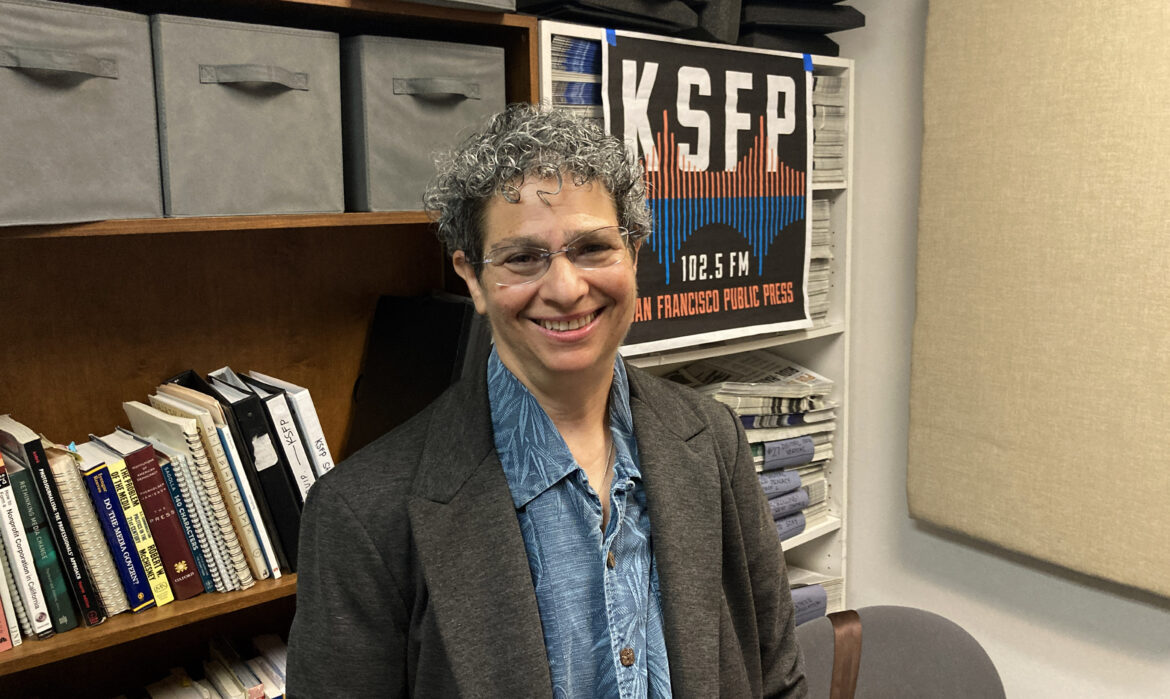California’s eviction moratorium protecting tenants affected by the coronavirus pandemic was set to expire June 30. Gov. Gavin Newsom signed legislation extending it, but the state law supersedes local pandemic eviction protections and prevents city legislators from adding new ones through March of next year. Ora Prochovnick, director of litigation and policy at the Eviction Defense Collaborative, a nonprofit organization that helps low-income tenants respond to eviction lawsuits, explained the details on “Civic.”
A partial transcript of the conversation is included below. It has been edited for length and clarity.
Laura Wenus: The state passed legislation that extends its existing eviction moratorium to Sept. 30. Tenants need to show that their inability to pay is linked to the pandemic and they need to pay a quarter of their rent. Is this like the arrangement we had before, where you need to have paid 25% of all your accumulated debt by Sept. 30? Or do you need to be making regular payments of 25% to stave off eviction every month?
Ora Prochovnick: It’s identical to the protections that we’ve already had. Everything is just kicked down the road for three more months. Tenants have the option to either pay incremental 25% installments each month or pay in one lump sum by the end of September. The only requirement is that all accrued rent from last September through Sept. 30, 2021 — of that full amount, 25% of it must be paid by the end of September. It’s 13 months. So, if we do the math, three-and-a-quarter months have to be paid.
Wenus: What is gone now that the state moratorium has superseded local protections?
Prochovnick: There is a policy in our legal system called preemption, which basically creates a hierarchy. If the federal government does something, the states have to follow along. Here, we’re looking at state preemption: If the Legislature in Sacramento passes a rule, San Francisco can’t contradict that. We have to follow it. San Francisco, unanimously through our Board of Supervisors, had put in place an eviction moratorium so tenants could not be evicted for non-payment of rent until the end of December, if their inability to pay was due to COVID financial hardship. And because of this preemption by the state law, that rule cannot be in effect. Instead, starting Oct. 1, tenants throughout the state, including in San Francisco, have to begin paying 100% of the rent rather than 25% that San Francisco had approved.
Wenus: If somebody gets an eviction notice, say on Oct. 1, what happens next?
Prochovnick: In San Francisco, we have a right to counsel program. It was passed by the voters in 2018 through Proposition F. And recently, our new budget from our mayor and Board of Supervisors has happily fully funded that program. A tenant being evicted should access the services through the Eviction Defense Collaborative, which will either represent the client or refer them to an agency within our consortium and make sure that they get the help they need to fight that eviction, with the assistance of counsel.
Wenus: The same legislation that extends protections also bars local officials from adding new additional local protections well into next year. What does that mean for tenants?
Prochovnick: There clearly were some tradeoffs in Sacramento to get this legislation to pass. There are some things in there that make tenants happy. And there are some things that make the real estate lobby happy. This preemption through March 2022 clearly is something that the Apartment Owners Association was seeking. The tradeoff is that once lawsuits start on Oct. 1, and through March 2022, there are requirements that the lawsuit not go forward unless the parties have fully and in good faith sought to access the rental assistance programs that are available. The concept being that evictions for non-payment of rent should not go forward if everybody could be made whole by these rental assistance programs.
Wenus: The legislative analyst has given us estimates for how much renters cumulatively owe in the city. At the low end, the office estimates that over 15 months of not paying rent, tenants in the city have accumulated debt of more than $147 million. At the high end, the estimate is $355 million. How does that compare with the money available for rent assistance?
Prochovnick: San Francisco has a pot of money that came directly from the federal government. And the second pot of money is funneled through the state. Those two pots of money have different rules about how they can be disbursed. There’s another proposition that our voters passed — $32 million has just been allocated from Proposition I money directly for rental assistance for tenants who have received notices or court papers for eviction.
If we’re around $140 million or $150 million, we probably can do it. But if we’re at $340 million, $350 million, $360 million, there will not be enough funds for all the rent that is owed, and evictions will go forward against those who were denied assistance. Not because they weren’t eligible, but because the funds ran out.
The new state eviction protection law, which allows evictions to commence in October, basically has a process where those unlawful detainer actions could not proceed unless the landlord could show that they had applied for rental assistance through one of these government programs and been denied. In the past, tenants had to come forward and assert defenses. Now, the landlord has the burden to prove that they’ve been denied rental assistance after good faith efforts to obtain it. And the tenant can still assert the defense of saying: ‘‘I have applied for rental assistance, and my application is pending.’’ And those legal proceedings will be stopped until the tenant’s pending rental application has been dealt with.
But the bad news is, once there is a denial, the eviction could go forward. There might be a denial because the tenant is not eligible, maybe their income is way too high. There might be a denial because the landlord does their application and the tenant ignores it and doesn’t take part. And to be fair to the landlords, we are allowing that eviction to go forward. And there might be a denial because the rental assistance program says: “Sorry, we ran out of money.”
Wenus: So, in other words: “Yes, you’re being evicted. Yes, your income is low enough that you should by rights get rental assistance. But because there isn’t any: Sorry, you’re getting kicked out anyway.”
Prochovnick: That is correct. It’s upon all of us to make sure that doesn’t happen. That might mean at the federal level, we need to cause that next tranche that we’ve referred to that has to come forward, or here at the state or local levels, we either need to produce more rental assistance money or change the laws because of how inequitable it would be to evict tenants in this situation.
Wenus: But we can’t add local protections because the state preempts them.
Prochovnick: Right. We can add money. We can’t add moratoriums.
Wenus: If I am a tenant who is worried about facing this deadline in October of paying 25% of the debt that I’ve accumulated, or that come October I’m really not going to be able to pay my full rent, what should be my first couple of steps?
Prochovnick: Tenants who currently are not able to pay their rent need to be sure that they have already submitted what we refer to as a declaration — a statement under penalty of perjury, informing your landlord that your non-payment is due to COVID financial hardship.
If the tenant has done that, the next step is to make sure that by Sept. 30, they need to pay 25% of the rent. Basically, that means three-and-a-quarter months. We want everybody to be making those payments by the end of September. If they can’t do it on their own, they should be accessing rental assistance programs now. Either the state or the city or a combination of the two.
And then starting Oct. 1, people need to do whatever they can to begin paying 100% of the rent.
How to get help: If you are facing eviction, call the Eviction Defense Collaborative at (415) 659-9184 or send an email to [email protected] as soon as possible. For those who require in-person assistance, walk-ins are welcome Monday, Wednesday and Friday from 10 to 11:30 a.m. and 1 to 2:30 p.m.










